How Rainfall approaches all clients as an extension of their team.
Atlis
is the next generation of local search, a platform where its community
can get real, personalized recommendations for almost any type of
business simply by asking. In essence, Atlis has brought word of mouth
recommendations to the digital space by rewarding quality interactions
from its users with cash, status, and most importantly a trustworthiness
score.
When
Rainfall was first approached by Atlis in the Spring of 2015, that
product vision had not yet been created, or in better words, discovered.
The story of our partnership is a journey that includes the creation of
a product, a brand, and a new behavior from scratch through constant
iteration, testing, and deployment.
Our approach to the next generation of branding
At
Rainfall, we call projects like Atlis “full brand expressions” because
we have the ability to affect every visual element and touchpoint, not
only defining the rules for how the brand is presented, but literally
designing each and every component in company’s suite whether it’s
printed, on the web, or in the product itself.
When
developing any large system we design multiple pieces simultaneously in
order to test ideas on a broad scale. Sometimes a particular approach
will work well in one situation but not adequately characterize the
overall language of the brand. Working holistically allows us to spot
those situations and find effective solutions earlier in the creative
process.
Creating
a full expression involves understanding how the visual language works
as part of the narrative fabric without interrupting the audience’s
ability to engage. This is especially true in the digital space, as each
platform serves a higher purpose than simply communicating the brand’s
visual identity. Atlis’s interaction model and methods for information
hierarchy are themselves components of the identity, so on the web and
in the product those elements are of highest importance.
Here’s a look at what we created together with Atlis.
The Atlis Visual Identity
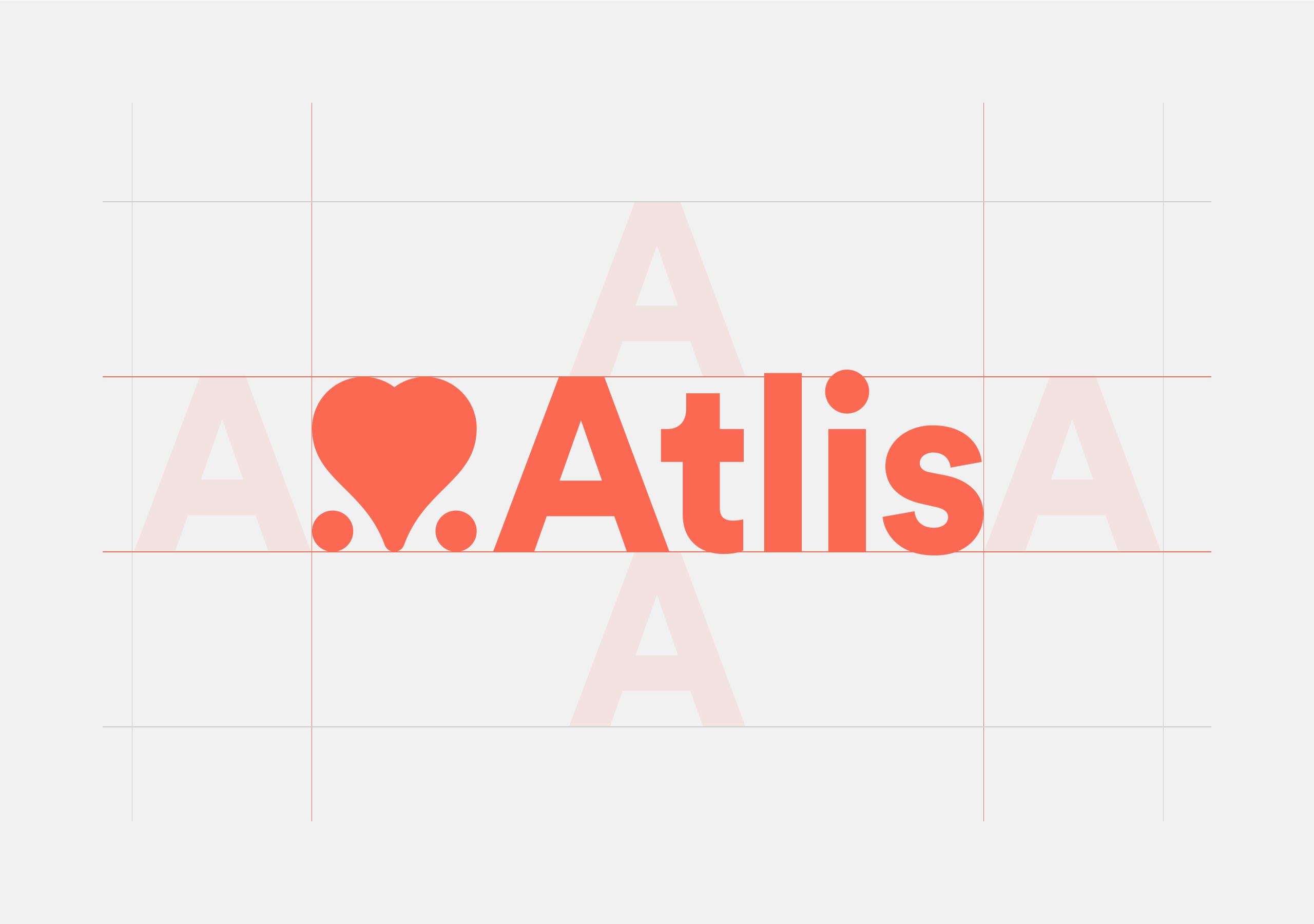
Atlis helps users make decisions
At
the start of our engagement Atlis existed as a big idea and a product
MVP. The working idea was that they could be the ultimate platform for
users to get trusted recommendations for businesses through a network of
their peers. At the time the mechanism for bringing that idea to live
was not yet complete, but there was a strong enough narrative structure
in place that we could strategically build a brand, a “favorite” between
two options.
The
Atlis logo, a heart between two dots, symbolizes the platform’s aim to
help it’s users make informed decisions when given multiple options. It
is quite simply the love that one shows for one business over another.
This mark fits with the company’s aim to strike friendly relationships
with both consumers and businesses in order to create a platform that is
mutually beneficial.
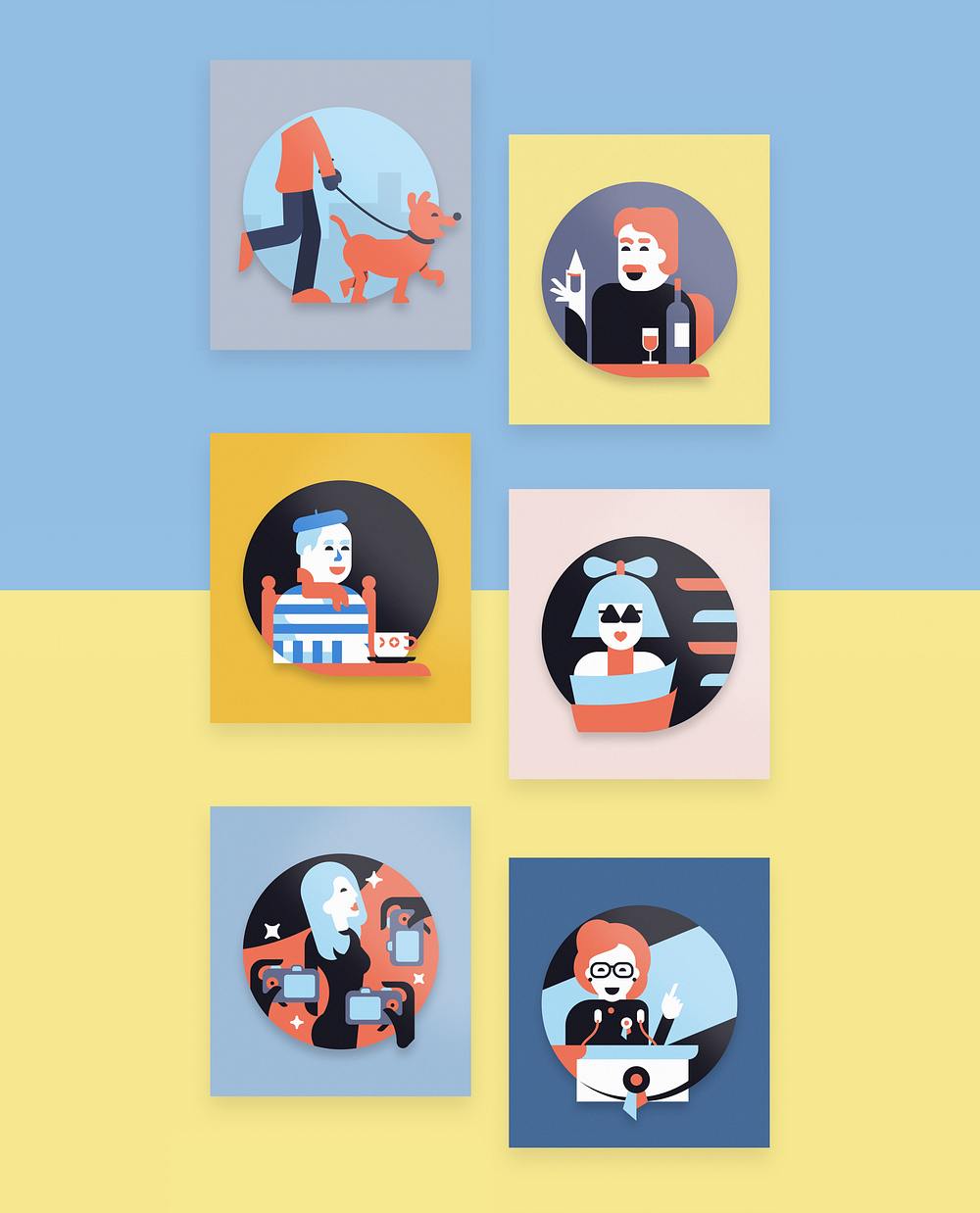
The Badges
At
this point Atlis had a visual presence but lacked the personality
required to excite its audience and encourage them to engage. As part of
a larger strategic exercise in gamification we developed a series of
badges to reward users for their participation and become the face of
the brand.
We
considered all of the individuals that compose the fabric of an urban
neighborhood to conceptually link each badge to a stage in one’s
knowledge of the businesses nearby. Each badge memorializes the journey
of discovery while also putting a face on Atlis.
The Atlis Product
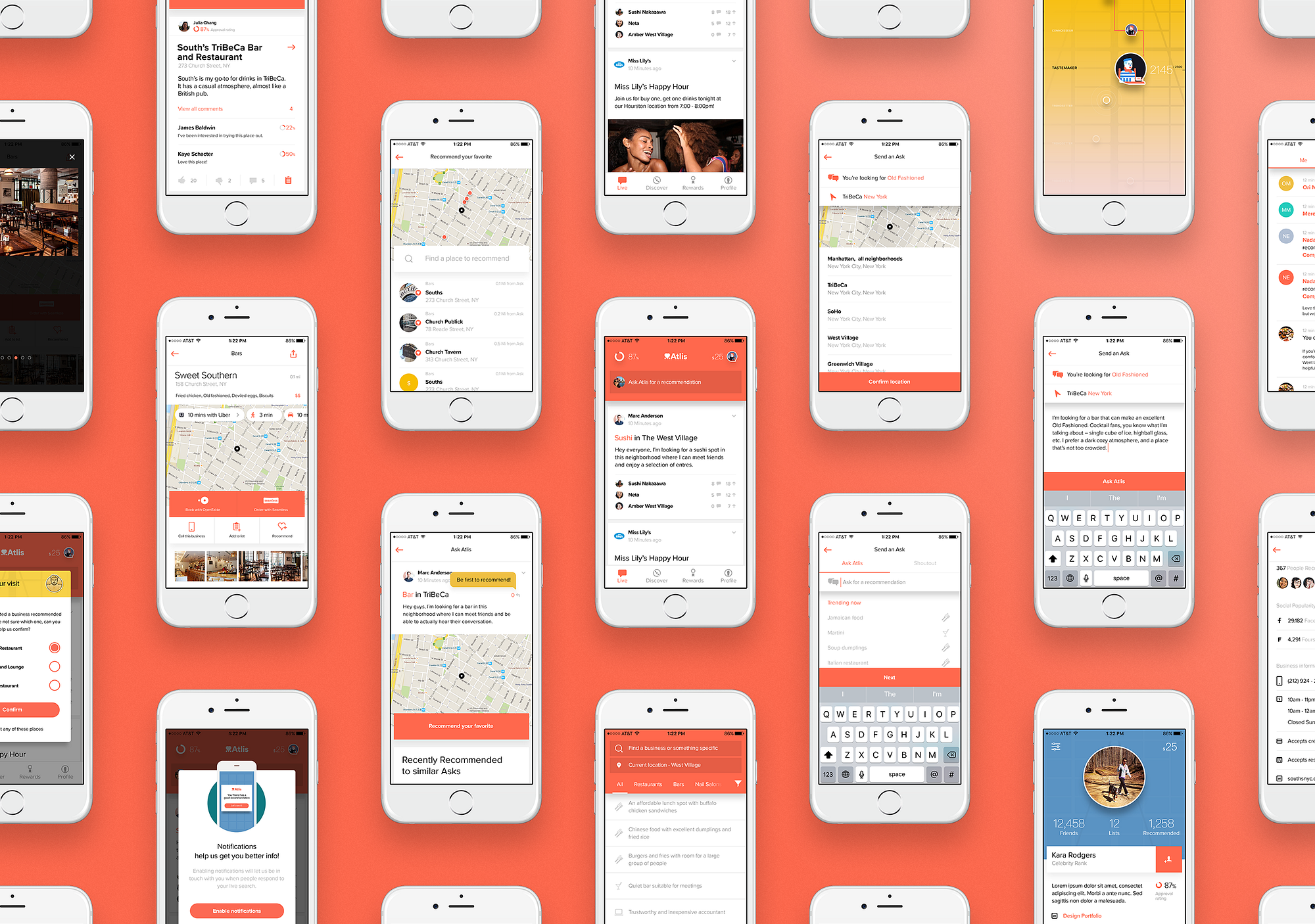
Central
to Atlis is its mobile product, the main platform on which community
members ask for advice finding businesses or respond to others with
their own recommendations. As a concept the experience design is simple.
There is a flow to ask for advice, a flow to view and respond to other
users’ asks, as well as the necessary user and business profiles.
What
started as a simple task of designing each of these flows developed
into an approach of constantly iterating to optimize interaction and
effectively display large amounts of supporting information.
The Ask Flow
#AskAtlis
was a term coined early in the project that embodied the ease by which
users would seek information. Our job was to deliver on that promise of
ease by making the Ask flow as effortless as possible.
In
early versions an Ask was just one step. The user would define what
type of business they were looking for, write a brief supporting
question, and confirm the preferred location all at once. While this
seemed easiest we found that breaking that process into three focused
steps resulted in a greater number of Asks and better insight into
specifically what users were looking for.
The Response Flow
With
over 20,000 users, recommendations begin to roll in almost immediately.
Asking is only half of Atlis’s equation, and our main concern when
testing the concept was that no one would respond as those Asks came in.
Our approach was to make responding just as easy as asking, but with
the added support of contextual information. When users opt to provide a
recommendation Atlis suggests businesses that they have previously
recommended or visited aided with additional context clues such as time
of day, current location, and how long ago their last visit was.
Enticement
We
knew that making it easy for users to respond wasn’t going to be
enough, so we wove gamification into the core of the product experience.
Each interaction with Atlis is an opportunity to earn points,
increasing one’s standing within the community and represented with the
badges developed as part of the identity. For additional appeal, users
are rewarded in cash when someone acts on their recommendation and
visits a business.
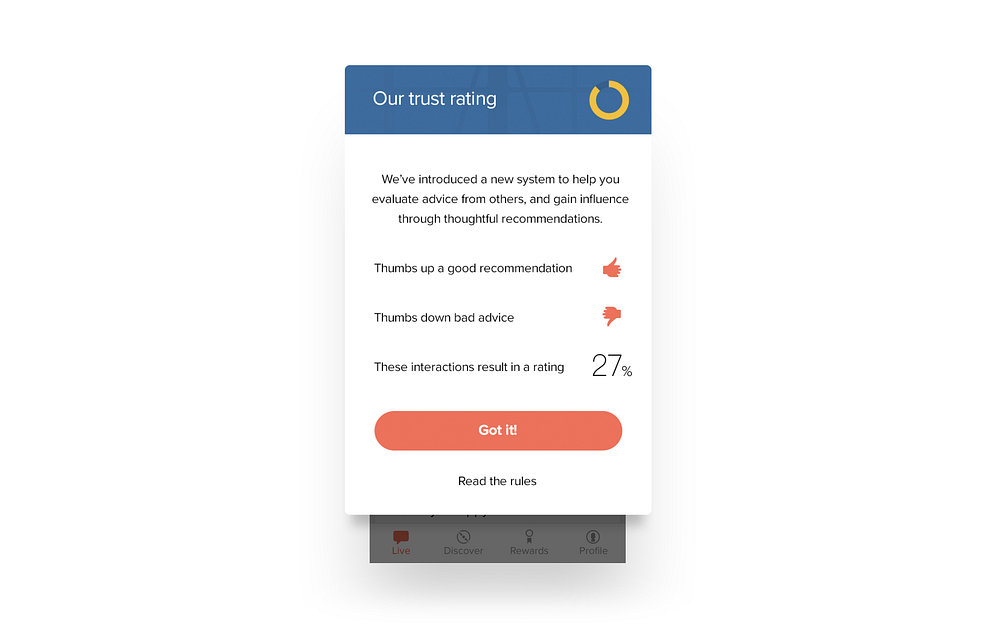
Trust
With
a platform for recommendations involving status and cash we soon found
it necessary to develop a means by which users could evaluate the advice
from others. Were users thoughtfully suggesting businesses or were they
recommending a place that they figured the asker would visit for other
reasons? We wanted to create a democratized system in which users held
each other accountable for good advice and where trust is earned through
positive engagement with the community.
A
simple thumbs up and down system encourages users to give their opinion
as to whether advice is relevant to the asker’s intent. Users who give
thoughtful advice increase their trust score, those who try to game the
system will see it decrease, simple as that.
Available anywhere
We
need to cater to everybody, from longtime Atlis community members, to
newcomers, to businesses owners claiming their profiles. This means that
Atlis takes on many formats and exists in various contexts throughout
the course of a single day or a single user’s journey.
A
full application suite serves this purpose, including a responsive web
product, mobile apps, marketing landing pages, and soon more. For the
web, every element is fully responsive with content and interaction
models that adapt to contextual information including location and time.
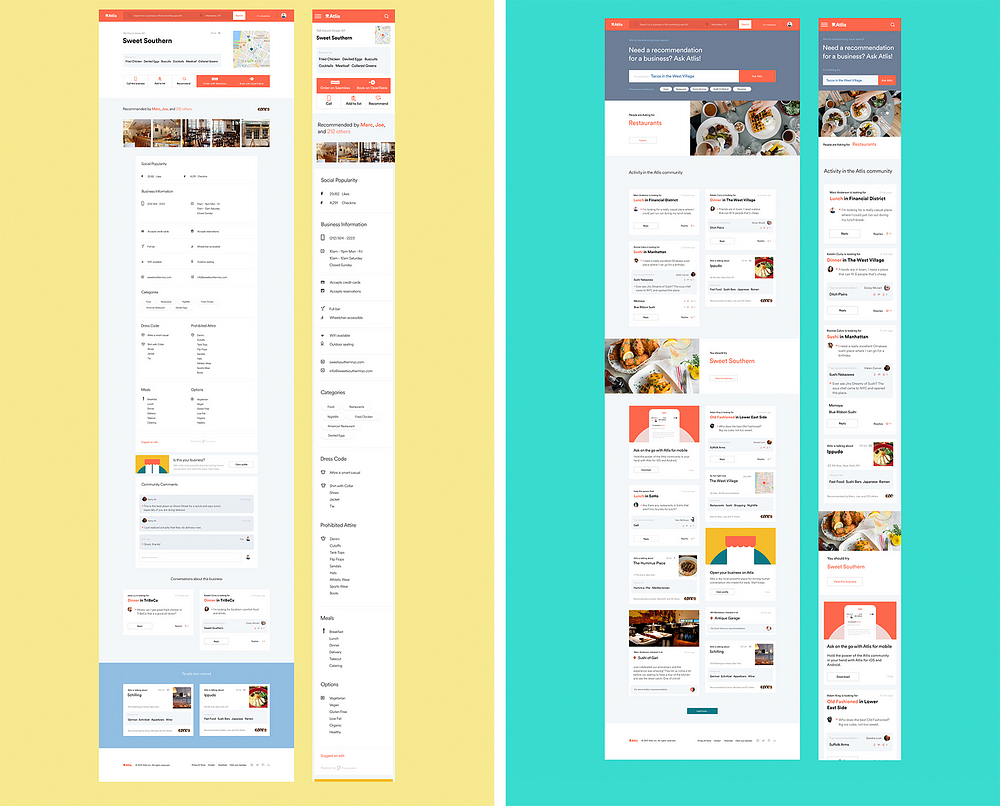
The result — a positive experience for businesses
Atlis
is extraordinarily beneficial for its users because they can finally
get real recommendations from locals and friends who know their
neighborhoods. With the addition of more ubiquitous touchpoints and
machine learning currently in development, the quality of information
will continue to increase.
The
value that Atlis is creating is just the first step in ensuring a more
positive ecosystem for businesses. Businesses can make themselves
discoverable to new clientele without average ratings and negativity,
while leveraging satisfied customers to promote their businesses.
Rainfall’s
close partnership with Atlis resulted in a consumer brand and product
suite with wild initial success. It is a demonstration that our approach
of honesty and mutual respect with clients leads to work that engages
users and encapsulates the brand’s ideals.


No comments:
Write comments